Why You Should Always Run Your Dishwasher at Night
Turns out the nighttime is the right time to run your dishwasher, and it's all because of one simple reason.


When do you typically run your dishwasher? Personally, I like to get it going after dinner before queuing up yet another re-watch of Parks & Recreation, or ahead of a big kitchen cleaning where I've (finally) cleaned out the fridge and the freezer.
But it turns out, a simple decision like when to run your dishwasher can actually have a big effect on your energy bill over time.
What the Experts Say About Peak Energy Hours
Appliance manufacturer Whirlpool recommends to "use a delay feature (available on some models) to run your dishwasher during off-peak hours. Local utilities recommend avoiding heavy usage of energy at certain times of day."
That translates to monthly utility bill savings. Most energy companies charge higher rates for energy used during peak hours—generally afternoons in the summer and evenings in the winter. (On that seasonal note, Whirlpool also encourages evening dishwasher loads for summer in particular. Not only will the energy cost be less; it'll keep heat from building up in your kitchen, giving your AC a break.)
This means you can lower your energy bill by simply checking your energy company's specific peak hours and waiting to run your dishwasher during off-peak hours. Plus, the same will apply to other household appliances like the washing machine and dryer—a chance for you to save even more money.
DTE Energy, a Detroit-based diversified energy company, encourages a best practice of "only running your dishwasher when it's full before 3 p.m. or after 7 p.m. on the weekdays." Like Whirlpool, they also endorse using the delay feature so you can set it and forget it while still harnessing the savings.
How To Check Your Energy Company's Peak Hours
The specifics of the on-peak and off-peak hours and the differences in cost per kilowatt-hour (kWh) will vary by energy company and location. Start with your energy company's website and look under the residential rate options for further information.
For example, my power company allows you to sign up for a residential rate that incentivizes shifting energy usage to off-peak hours. The demand then is lower, so you pay less. In my case, I'd pay one-fifth the rate per kWh by running my dishwasher between 10 p.m. and 6 a.m. during the high energy usage summer months.
Even if I didn't want to wait until late to run my dishwasher, avoiding these peak afternoon hours of 2 p.m. to 7 p.m. from June to September could save me a lot of money over the course of the summer.
So, When Is the Best Time to Run Your Dishwasher?
Of course, the peak hours will vary by area and time of year. But as a rule of thumb, the least expensive time to run the dishwasher is at night, when lights and TVs are generally turned off and the grid isn't in high demand.
Note: For fire safety reasons, only run appliances like dishwashers while you're home, and try to avoid running them when you're sleeping. If you're not a night owl, consider running the machine early in the morning before you go to work to still snag the cost savings.
So even if you don't want to rework your cleaning schedule, simply avoiding using large appliances during peak afternoon hours, especially during the summer months, can keep your utility bill in check.
A version of this article originally appeared on MyRecipes.com












